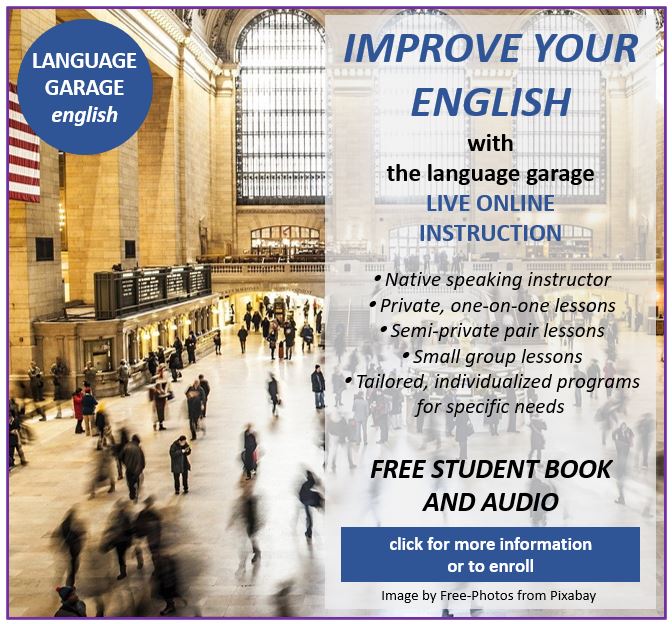Image by Naassom Azevedo from Pixabay
In this post we’ll look at some vocabulary and structures that you can use in English when you want to talk about schools and universities.
Where do you go to school?
Lets start with some basic vocabulary. Of course you can use the word school to describe any building or institution where people learn. In the US, you may here primary school or elementary school to describe the schools that students go to before high school, and secondary school usually means the same thing as high school. If a town is large enough, there will probably be a middle school, which is typically grades six, seven, and eight, but there is variation depending on the size of the town. Above secondary school is higher education: colleges and universities. Before primary school there is kindergarten, and before kindergarten there is nursery school or preschool.
- Our daughter is four years old, and she goes to nursery school/preschool.
- Our son is five years old, and he’s starting kindergarten this year.
- When children are six years old, they usually start going to elementary school.
- Elementary schools in the US are typically divided into grades.
- First graders are about six years old, and eighth graders are about thirteen or fourteen.
- Middle school is typically for grades six, seven, and eight.
- High school is usually four years, from ages fourteen until eighteen. Ninth graders are also called freshmen. Tenth graders are also called sophomores. Eleventh graders are also called juniors. Twelfth graders are also called seniors.
- Some students go to vocational-technical schools instead of high schools to study a trade.
- After high school, many students go to college or university.
- College or university students are also called freshmen, sophomores, juniors, or seniors in the US.
- The first four years of college or university are called undergraduate (or undergrad).
- Graduate school (or grad school) is for advanced degrees, for example a Masters or Doctorate.
Notice that in the US it’s very common to refer to high school or college students as freshmen (first year), sophomores (second year), juniors (third year), and seniors (fourth year.) The words college and university are used interchangeably, but technically, a university is much larger than a college, and in fact there are several colleges in a university, divided by field of study.
- Bill just started high school. He’s a freshman.
- Sandy is a senior in high school. She’s getting ready for college.
- Laura is a junior in college, so she’s going to be finishing school next year.
When speaking about the children or young adults learning in a school, you can always use the word student. You may also hear pupil to talk about young children in elementary school. When speaking about the adults who teach, the most common word is teacher, before college. In college, the word professor is usually used. A professor has a doctoral degree in the field that he or she teaches, while a teacher may have a masters or lower degree.
- How many students/pupils are in your class?
- The teacher stands in front of the class when she teaches.
- Sarah is a professor at the university.
The word grade in American English has two meanings. First, it refers to the year that a student is in, for example first grade, second grade, third grade, and so on. Grades are also the scores that students get for their classes. A+ is the highest grade, D is the lowest passing grade, and F is a failing grade, meaning that a student did not successfully complete the test, class or year.
- What grade is your daughter/son in?
- She’s in third grade this year.
- I always got good grades in school.
- Did you get a passing or a failing grade in the class?
- I got an F. I failed, and I have to take the class again.
In the Classroom
Now let’s look at some vocabulary to help you talk about the classroom. Usually, a classroom has rows of desks that face the teacher’s desk and the blackboard/whiteboard. Other objects you’ll typically see in a classroom are: bookshelves, maps, a globe, and a screen.
- How many desks are there in this classroom?
- The teacher writes on the blackboard/whiteboard when she teaches.
- The students sit in their desks and pay attention to the teacher.
- The teacher points to the map/globe/screen.
- A map of the United States is hanging on the wall.
- The globe shows every country on the planet.
School supplies are important for students. The most common ones are: a notebook, textbooks, paper, a pencil, a pen, an eraser, a backpack, a tablet, a calculator.
- The students take notes in their notebooks while the teacher teaches.
- Do you have an extra piece/sheet of paper?
- If you make a mistake with a pencil, you can use the eraser.
- Textbooks are heavy and expensive.
- The students carry their books home in a backpack.
School Subjects
Typical subjects in primary school are: math (mathematics), science, geography, social studies, reading, history, and physical education (PE). Students may also take art, music, or languages. In high school, subjects are usually more focused. In math, students learn algebra, geometry, trigonometry and calculus. In science, students learn about geology, biology, chemistry, and physics. They may also begin to study literature, art history, drama, creative writing, and philosophy. In university, the subjects become even more specific: anthopology, business administration, linguistics, astronomy, economics, psychology, computer science, and so on.
Here’s some vocabulary for talking about the subjects you like, and the ones you don’t.
- What’s your favorite subject?
- History is my favorite subject.
- I’m good at languages.
- I’m doing well/getting good grades/excelling in biology.
- What’s your least favorite subject?
- I don’t like math.
- I’m bad at science. I’m horrible/awful/hopeless in biology. I stink/suck at math.
- I don’t understand chemistry. I don’t get chemistry.
- I’m doing poorly/getting bad grades in physics.
Be careful with the expression suck at. It can sound a bit vulgar, but it’s commonly used in casual speech. If you want to sound more polite, say I stink at or I’m really bad at instead.
Homework and Tests
Students at all levels are expected to a lot of homework. They have to review their notes, study for tests, take (and hopefully pass!) tests or exams, and write reports or term papers. Students usually know when they have tests that they have to study for, but the teacher may also give them a pop quiz that they aren’t warned about. Hopefully they’ve been paying attention!
- We have a test tomorrow, so I have to study tonight.
- I’m taking a test. I hope I pass, but I’m worried that I may fail.
- I have a lot of homework every night.
- I have to memorize new vocabulary.
- I got a good/bad grade on the test.
- We have to write a book report / a term paper for this class.
- I passed/failed the class.
At University
University students choose a major, the subject that they focus on. They often also have to choose a minor, which is a secondary field that they focus on less. Each course that they take is worth a certain number of credits, and students usually take a certain number of credits each semester. If an academic year is divided into two parts, they’re called semesters or terms. If it’s divided into three parts, they’re called trimesters.
- What’s your major? What are you majoring in?
- I majored in French literature, with a minor in history.
- How many credits are you taking/carrying this semester?
- The spring semester starts next week.
A class in college or at a university is called a course. A course may be a lecture, which involves a lot of reading and usually a large number of students in a lecture hall. A seminar is usually smaller, with a smaller group of students focusing on a particular subject. Science courses often involve laboratory work, where students perform different experiments, for example in chemistry. Typically, students have two major exams during a term: a midterm and a final exam, which account for most of their grade. They may also have to write a research paper or a term paper. Students may study in their rooms, in a study hall or lounge, or at the library.
- I’m taking a really cool course on art history this term.
- The lecture hall can seat hundreds of students.
- My seminar on the Industrial Revolution only has eight students in it.
- The molecular biology course includes lab work.
- Our midterms are next week, so I need to start studying.
- We have finals / final exams in December.
- I didn’t finish my term paper, so I asked the professor for an extension.
- There’s a comfortable and quiet study lounge in our dormitory.
- I’ve been spending every evening at the library getting ready for finals.
In the US, college students usually live on campus, meaning on the land owned by the college or university. University housing is usually in a dormitory (dorm), also called a residence hall, where students often have roommates. Some students live off campus, meaning they rent an apartment in the city or town outside of the campus, or they live at home with their parents. Students typically eat in a dining hall, or of course they may choose to go to restaurants or cook in the dormitory.
- Which dorm do you live in?
- I have two roommates and live in a dorm on campus.
- I lived on campus my freshman and sophomore years, but then I moved off campus.
- I don’t feel like eating in the dining hall tonight. Let’s go to a restaurant.
The most common undergraduate degree in the US is a bachelor’s degree. That gives students a broad and general knowledge of a field of study. When students graduate, they may decide to enter the workforce, or they may want to continue their studies. The two most common graduate degrees are a Master’s degree and a doctorate/doctoral degree/PhD. For a master’s degree in the US, students must complete two or more years of additional coursework, and they typically write a thesis, which presents a summary of research in a particular field and shows a student’s mastery of it. A doctoral dissertation in the US is a long paper that summarizes or critiques previous research, and that also contributes a new theory or original research in the field. Graduate students usually have to defend their dissertations, meaning they must present the paper to specialists and answer questions that challenge it.
- I want to go to grad school, but I’m not sure whether I want a master’s or a PhD.
- John was in a doctoral program at the graduate school for years.
- What is your thesis/dissertation on?
- I have to defend my dissertation next week, and I’m very nervous.
Learn English with the Language Garage!
If you’re interested in ESL/EFL lessons, please check out our English courses. We have private lessons, lessons for you and a friend or colleague, or small groups. Or see our other posts on English grammar, vocabulary, and more.





